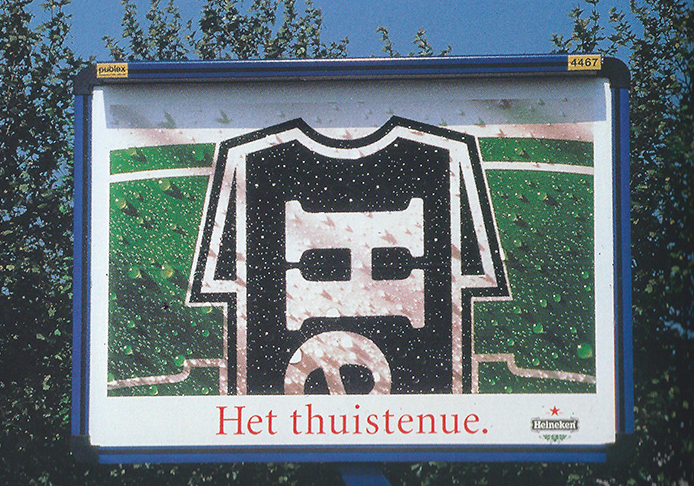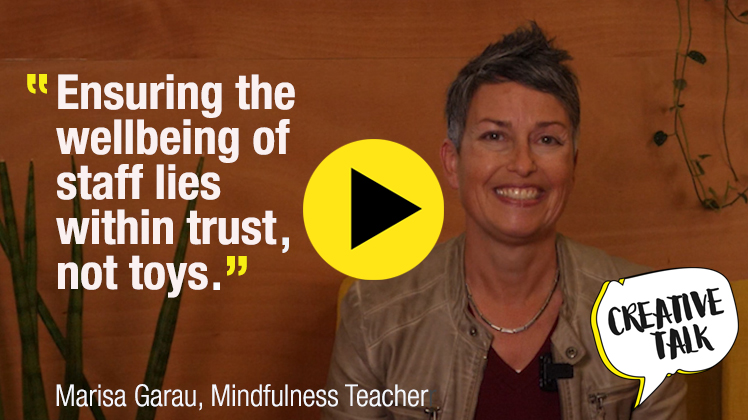Creative Talk with Marisa Garau, Growing Mindfulness
This month’s Creative Talk is with Marisa Garau, Mindfulness teacher at Growing Mindfulness. We ask Marisa about her journey from advertising agency owner to Mindfulness Teacher and what life is like running a Mindfulness business.
As a teenager, I happened to be exceptionally good at both drawing and writing. The Gerrit Rietveld Academy of Arts in Amsterdam loved my graphic design work. I was accepted but only studied there for a few months because we were expected to make weird and ugly stuff that didn’t make sense to me. So I decided to pursue my other dream, which was languages, and I switched to studying Dutch and English at the Teachers College in Rotterdam. But after a few apprenticeships at secondary schools, I knew that being a secondary school teacher would be too sedate a life for me. I then applied at the Willem de Kooning Academy of Arts in Rotterdam where I started the brand-new and exciting study Copywriting alongside the students' Art-direction.
Losing my creative sanity at ad agencies
In 1993 I graduated while already working at an agency in Amsterdam. Quite soon I discovered that the dream I had had about a cool career in the sexy world of advertising, came down to working a pretty standard job in a soul-crushing office cubicle — ouch! At JWT’s ad mill where my award-winning ideas for Heineken were indifferently faxed (yes, faxed!!) to the client, I rebelled against agencies’ politics and reasoned that I could just as well run my own agency and regain my creative sanity. Delightfully naive and not being hindered by any business experience, I started my own agency in 1995 and ran it for ten successful years. My business partner and I took on all kinds of work — ad campaigns, commercials, websites, brochures. And to our own surprise, we did incredibly well!

Love and hate in the world of journalism
We also broke into journalism with a unique proposition. For an international movie or album release, the tiny country of the Netherlands was always only granted one interview with the starring actor or pop star. Usually, this interview went to the biggest newspaper. Our USP was that with one hour-long interview covering different topics, we would sell and write a cluster of articles for a variety of media, such as a newspaper, a business magazine, a women’s magazine, a TV guide, a fashion magazine.
The movie and record companies loved this approach as it guaranteed their latest movie or album maximum exposure. However, the Dutch media were less enthusiastic, but they didn’t have much of a choice: it was either no interview and no article, or buying the article from us! I have been sent around the world and stayed in five-star hotels to meet entertainment legends, all of whom I have very fond memories because these people were great examples of perseverance and work ethic.
A new mindset with mindfulness
In the final years of running my agency, both the work and the collaboration with my business partner became stale and predictable, and I developed chronic stress with serious consequences, such as depression and autoimmune disorders. Late 2005 I hit rock bottom and burned out, and quit my agency. I didn’t like myself anymore. I felt completely stuck within my endless worrying and negative thoughts. A friend then suggested mindfulness. That resonated with me because I had been reading a library worth of Buddhist and self-help books in those previous years, but without much effect, because reading is good, but not as good as doing.
Mindfulness encouraged me to put its incredibly sensible principles such as acceptance, patience, letting go and trusting, into practice. And so I liberated myself from the unhealthy habit of overthinking and stressing out. With mindfulness, I learned to value myself for who I am. It made me understand that I am deserving of appreciation and love without if’s and but’s, while I had always believed love had to be earned by stretching myself to the max and achieving exceptional feats.
Writing books in New Zealand
In 2006 my husband, who had sold his shares in his ad agency, and I were ready to work on a dream we had been cherishing for many years: moving to a new country and living a more simple life. In 2007 we were granted the Kiwi visa and settled in beautiful Mangawhai on the east coast, an hour north of Auckland. Here I wrote two internationally published bestsellers on mindfulness.

Online income — freedom income
Seven years ago we started an online mindfulness platform, Growing Mindfulness, for two reasons: teaching people how to reduce the damaging impact of stress, and creating a time and location independent income for ourselves. In the role of freelance copywriter and art director/graphic designer, we are used to trading our hours for money and to work according to the client’s deadline. But in order to find a better balance in both income and job variety, we set out to create an income stream that would give us the freedom to work when and where we wish.
With Growing Mindfulness, we sell Karma Kickstart, my meditation-free mindfulness e-course. It’s a product that solves a very urgent need, with 200,000 unique visitors having explored our website in 2018.

Forget meditation
My unorthodox approach to mindfulness is different from the standard mindfulness training course. I have followed that training after my burnout, then trained under several mindfulness masters in Europe, Australia, Asia, and New Zealand. The emphasis is always on meditation. But no matter how wonderful and interesting this seems… most of us, who work full time and have a family to care for, don’t have the luxury to spend an hour a day on a meditation cushion. And so mindfulness is reduced to yet another chore on their overflowing to-do lists. The result is that people think mindfulness is not working for them. I meditated for many years until I slowly started practicing being mindful in everything I do. I don’t have to plan for mindfulness — I simply practice it all day long.
This approach is easier to apply for many busy people like myself, and it is more effective. If you bring your stress levels down several times a day, right when you need it, you feel much better and balanced throughout the day than when you would only relax once a day or once a week.
There are three mindfulness steps you can take right now when you feel overwhelmed and stressed:
- Realise that you are more than your thoughts
Understand that you have thoughts, but that you are not your thoughts. Stress forces you to fully identify with your thoughts. But while your brain produces thoughts, you are more than just your thoughts: you are the owner of your brain, and you are the spiritual being behind your thoughts. You are much more than just these thoughts.
This insight creates a distance between you and your thoughts, and within that distance, you can choose to be overwhelmed by these thoughts… or see them for what they really are: usually silly, frightening stories that are typically blown out of proportion. So when you feel stressed, notice that your mind is producing a lot of thoughts, mostly negative ones that are filled with blame, regret, anger, or judgements. Then tell yourself: ‘These are only thoughts, produced by my brain. I am more than these thoughts that are now being triggered by an incident that I won’t even remember in a few weeks' time. I am the master of my mind, not its slave. And I won’t be dragged into the panicky stories my mind likes to cook up.’ Then take a few deep breaths and return to focussing on your task at hand.
- Practice acceptance
Acceptance is one of the mindfulness principles I found very hard to deal with. Acceptance for me felt like allowing people to walk all over me. But it’s not! Acceptance is a very powerful principle because it stops you from wasting energy on fighting the reality of your situation.
So if you feel stressed after a negative response on your creative work, or when you’re working against a tight deadline, or when your colleague made a snarly remark, sit quietly for a while and watch the thoughts rushing through your mind: ‘They really don’t know what they’re talking about!! This deadline is impossible, why are they doing this to me?! How dare she talk to me like that?!’ Watch all these angry thoughts tumble over each other, fighting for your immediate judgment.
Then accept that the human brain gets triggered easily, and naturally produces all kinds of negative thoughts. Now, fully consciously, accept how you feel under these emotions. Don’t be tough on yourself, blaming yourself for feeling hurt and disappointed and humiliated. Be kind to yourself, like you would to an innocent child or pet. It’s what it is, and stressing out about how you feel is not going to change reality. If you feel hurt, allow this feeling to be present. Don’t push it away, but actively embrace it. You’ll find that acceptance creates space in your heart and that it will allow you to let go and calm down.
- Distract your thoughts
Contrary to popular belief that our brain can multitask, extensive brain research has shown it can’t. And that’s good news! When you feel stressed and you are getting overwhelmed by negative, scornful thoughts, you can stop this damaging process by focussing on a simple task.
If you focus on a chore, your brain simply doesn’t have space to produce stressful thoughts. So choose a simple task, like tidying your desk. Fully focus on your hands picking up papers, magazines, books, notes. Focus on deciding what can go, what must stay, and what needs to be filed. Focus on your body while you’re doing this — your feet on the floor, your legs, your spine, the fine movements of your shoulders, your neck, your arms, your hands: are they relaxed or tense, supple or rigid? Then appreciate your body for being at your service always. Being present in your body is a great way to distract and relax your busy mind.
Work stress: the new normal
In the past years, I have seen the phenomenon of work stress grow into a frightening monster that throws millions of people worldwide into burnout. I receive many emails from clients, and they all write to me that they are burned out. It’s a real epidemic. I have researched its causes and possible solutions; asked a variety of professionals to share their views upon this topic, among them Elin Stonham of The Creative Store; and put all my findings into this article on work stress. Make sure to check it out and benefit from the down-to-earth tips to contain stress at work.
How you can reduce work stress among your staff, and increase job satisfaction:
Work stress and burnout cost US businesses an estimated $300 billion annually, with one in three working Americans reporting being stressed on the job. Around 38 percent of the world’s workers are suffering from excessive pressure on the job. In New Zealand, more than 30 percent of employees state that their level of stress has risen in the past five years, while UK businesses lose 12.5 million productive working days per year due to employees calling in sick caused by work-related stress issues.
Thanks to the more relaxed lifestyle in New Zealand, I think employees here cope better when it comes to work stress since we’re not a crowded country like European countries. Also, the healing qualities of nature such as solitude, quiet and reflection, are within everyone’s reach… even if you work in the city.
However, Kiwi employers can prevent staff from stressing and burning out if they would have a good, honest look at the generally accepted working conditions that force each and every employee in the same outdated mold and suppress rather than utilize their unique traits and preferences.
- Give trust, not toys
Now that the crazy office trend where employees meet in Mario Brothers themed rooms and spend brainstorm sessions on swings and skateboards is slowly losing its appeal, employers start to realize that ensuring the wellbeing of staff lies within trust, not toys. I interviewed employees about work stress, and guess what their number one complaint is: micromanagement. Even though research shows that it is creativity killing and soul-crushing, many managers still cling to this unproductive management style.
Trust is a powerful mindfulness principle and works in every situation — at home with your partner and children, as well as at work with your employees and co-workers. Trust means that you trust in your employees’ skills and work ethic. Staff is hired based on their qualifications and work experience, so why not assume that they know how to do their job? There is no need to breathe down their necks every minute of the day, dictate how to do their work, control them, tell them off, or give them ‘constructive’ feedback which only makes them feel miserable and demotivated. These are all (proven) counterproductive management techniques.
Leaders need to learn to let go, and have faith in the capabilities of their workers. Naturally, they must be available if guidance is needed. Otherwise, they had best remain in the background and let their staff take care of the jobs on hand.
- Allow for autonomy
Closely interwoven with trust is allowing employees to work according to their own preferences. We never seem to question the ‘one size, must fit all’ doctrine, which originates from the Industrial Revolution where people worked in factories and were turned into production units. But haven’t we noticed that times have changed and this is the 21st century?
In this technology-driven era start-ups that claim to be ‘disruptive’ still, stick to that Victorian tradition — meekly hiring an office space where they can hurdle together and work from nine to five. With all the technological possibilities available to us now, we can work when and where we like, and still be more connected than ever. But somehow employers live in the illusion that packing their employees in a dull office space is the only way to make them super-productive. They rather see their staff wasting at least three hours a day right under their nose (checking email, Facebook, Instagram, travel websites, TradeMe) than being highly productive in the quiet of their own home, in the hustle and bustle of a cafe, or wherever they work most efficiently.
Most people have strong work ethics, understand deadlines, and want to get results. Trust me, they’ll be fine, wherever they work. I sometimes hire freelancers myself, and I don’t care if they take the whole day to write an article for my website, or spend thirty minutes on it and then take off to the beach… as long as there is a properly written piece of copy in my inbox at the end of the day. When people work autonomously, in the office or at home, during the day, evening or night, whatever suits their natural rhythm best, they perform optimally and get the best results. This freedom will lower their stress levels, while employers will lower their risk of having to pay for sick leave due to work stress and burnout.
- Offer individual workspaces
No matter how modern it seems… the scientific research that the open office plan doesn’t work is overwhelming. We are social animals and highly sensitive to each other’s moods. Having to spend eight hours a day in other people’s energy, sometimes positive, sometimes stressed, sometimes angry and negative, is a health hazard that is categorically ignored by employers. Colleagues walking in and out, talking to each other, talking on the phone, turning on the radio, making snarly remarks because they are going through a tough time… how can you focus on your job in such a hectic environment?
To improve wellbeing and productivity, employers who don’t trust their people to do their job when they are not in the office should at least offer individual workspaces. Employees who need their own space to perform optimally, then have the option to retreat and spend a few hours in complete solitude, free of group dynamics to get their work done.
Watch Creative Talk with Marisa Garau
Try Marisa’s Karma Kickstart with The Creative Store discount code
If you would like to lower your stress and increase your happiness levels, try Karma Kickstart, Marisa's meditation-free digital mindfulness course.
With The Creative Store discount code TCSRELAX you won’t pay 118 NZD, only 80 NZD.

